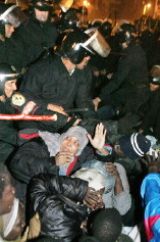Sudanese refugees death toll rises to 27 – embassy
Jan 1, 2005 (CAIRO) — The death toll from Egypt’s violent clearing of a Sudanese refugees camp rose to at least 27 today as a presidential spokesman expressed sorrow and garbage collectors moved in to clear the trash from a failed three-month protest.
 According to the official SUNA a delegation from the Sudan diplomatic mission and SPLM office in Egypt said it counted 27 fatalities including eight women, seven men, and 12 children.
According to the official SUNA a delegation from the Sudan diplomatic mission and SPLM office in Egypt said it counted 27 fatalities including eight women, seven men, and 12 children.
About 2,000 Sudanese had been living for months in a dilapidated tent city near the offices of the U.N. High Commissioner for Refugees, demanding to be resettled abroad. Their encampment was viewed by many residents as an eyesore in one of Cairo’s upscale districts.
Following the huge death toll the Sudanese embassy in Egypt adjourned a reception organised on the occasion of the Independence Day.
Thousands of Egyptian riot police massed around the square early Friday and tried to force the demonstrators onto waiting buses. When they refused to leave, police fired water cannons and beat them with clubs. The clashes dragged on for hours; television footage showed the Sudanese fighting back with tent poles and bottles.
“They didn’t have to go that far,” said Fathy Zayed, 50, an Egyptian who said police beat the protesters mercilessly. “There were women and children there.”
The confrontation “came after the UNHCR office in Cairo received warnings of possible assault on its headquarters and staff, which in turn asked the security to protect them and disperse the sit-in,” the statement said.
A UNHCR spokeswoman told Reuters news agency that the organization had no warning that the police would raid the tent city Friday morning.
“There were a lot of dead bodies,” said an ambulance driver from a nearby hospital, called by police to remove the bodies. “I know they said there were 10, but there were a lot.” The ambulance driver declined to give his name.
At Embaba General Hospital, where some bodies were taken, workers with a humanitarian agency tried to get more details on the status of the injured and demanded information on the whereabouts of the dead protesters’ remains. They could confirm only that three bodies were at Embaba. They had already been denied access to three hospitals around Cairo, they said.
Sudanese asylum seekers have trickled into neighboring Egypt for years to escape civil war. Upon arrival, they are expected to register with the UNHCR to be recognized as asylum seekers and receive an interview date for determining refugee status.
But the UNHCR stopped hearing the cases after a peace deal ending Sudan’s civil war was signed in January.
It was this legal limbo, along with the lack of medical care, work permits and education they faced in Egypt, that drove the Sudanese to begin the protest. Crammed together in the tight space, they had only blankets to protect them from the winter chill. They survived by picking up jobs where they could. Many of the men worked in construction.
As the months passed, many residents and shopkeepers in the area grew resentful of their presence. Witnesses said that Egyptians looked on in approval Friday as police beat the Sudanese.
Gamal Nkrumah is the foreign desk editor of the Cairo-based newspaper Al-Ahram Weekly, said to Voice of America that neighbors eventually complained to the police about drinking and reported rowdiness in the camp. He also says there may be an element of racism behind the treatment of the asylum seekers and refugees – especially those from southern Sudan.
“They were drinking alcohol, getting drunk, and all this in front of the mosque,” Noha Mohammed, a 20-year-old student, told the Los Angeles Times as she came out of a restaurant near the square. “I don’t understand the problem. Why don’t they just go back to Sudan?”
Barbara Harrell-Bond, chairwoman of the Africa and Middle East Refugee Assistance project and professor of forced-migration studies at the American University in Cairo, argued that the standoff could have been avoided.
“UNHCR’s first words to us were, ‘These people are of no concern to us,’ ” Harrell-Bond said. “If UNHCR hadn’t come out with such provocative statements, heels wouldn’t have been dug [in] so far.”
But Harrell-Bond, who works closely with the Sudanese refugees, said she had advised them against their protest.
“The bottom line is all of them want to be resettled and sent out of Egypt, and they have good reasons,” she said. But she said they should have drawn attention to the discrimination they faced and tried to gain access to services.
The UNHCR’s efforts to resolve the situation “simply came too late,” she said.
(ST/LAT)
